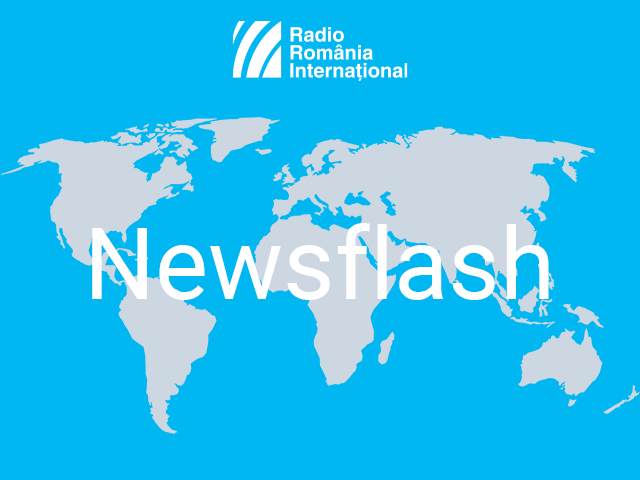October 12, 2022 UPDATE
A roundup of local and international news.

Newsroom, 12.10.2022, 19:47
Inflation. Alongside Belgium, Luxembourg and Slovakia,
Romania recorded the highest drop in industrial production in August this year
compared with August last year. According to Eurostat, Romania saw an increase
of 0.1% in industrial production in August, following a 0.5% increase in the
previous month. Also, the annual inflation rate rose in Romania to 15.88% in
September this year, from 15.32% in August, as the price of food products
increased by over 19 percent, that of non-food products by almost 17%, and that
of services by 8%, according to data published by the National Institute of
Statistics. The International Monetary
Fund revised significantly upwards the forecasts regarding the growth of
consumer prices in Romania both for this year, from 9.3% to 13.3%, and
especially for next year, from 4% to 11%, according to the latest World
Economic Outlook report published on Tuesday.
Visit. Romanian president Klaus Iohannis
thanked the Dutch prime minister Mark Rutte for the presence of Dutch military
in Romania, saying that alongside the other allied troops, they make Europe
safer and are protecting Euro-Atlantic values. Your presence here demonstrates the unity, coherence and high
responsiveness that define NATO – the strongest political-military Alliance in
history – and us as Allies, said president Iohannis in Cincu, in Brasov county, in the centre, where he visited the Getica
Joint National Training Centre together with the Dutch prime minister Mark
Rutte and the Romanian prime minister Nicolae Ciucă. Prime minister Rutte said
allied countries stand together against Putin’s
war of aggression and that the attempt to divide NATO only made this alliance
stronger. In another development, president Iohannis said he talked to the
Dutch prime minister Mark Rutte about Romania’s accession to the Schengen
movement-free area and that he was hoping all political conditions for that to
happen would soon be met. He reiterated that Romania is fulfilling all
technical requirements and is already acting as a de facto Schengen member in
order to protect the European Union and its external borders in the spirit of
European solidarity. Prime minister Rutte said his country was not, on principle,
against Romania’s accession to Schengen.
NATO. France will send a reinforced
company of armored infantry fighting vehicles and a squadron of Leclerc tanks
to Romania to bolster the NATO Battle Group (Battle Group Forward Presence)
deployed in Cincu, in the centre of Romania, the Defence Ministry has
announced. The group was created in May through the transformation of the
allied multinational elements within the NATO Response Force deployed in
Romania. At the proposal of Paris, France took over the role of framework
nation of this Battle Group which also includes, by rotation, forces from
Belgium and the Netherlands. On Tuesday, the President of Romania, Klaus
Iohannis, welcomed, on Twitter, President Emmanuel Macron’s decision to
strengthen the French military presence in Romania. It is an important move for
NATO’s Eastern Flank, a sign of Allied solidarity, Iohannis said.
Ukraine. The 27 EU member states agreed on a military
mission to train Ukrainian armed personnel in several member countries, said
France Presse news agency on Wednesday, quoting diplomatic sources. The
Brussels ambassadors of the 27 EU member states reached an agreement which will
be put to a meeting of EU foreign ministers next Monday in Luxembourg. The
agreement provides for the establishment of a mission’s headquarters and
training centres in each member state that provides training. The idea of the training
mission was announced in August by the EU foreign policy chief Josep Borrell.
Refugees. Surveys conducted by the International
Organisation for Migration among refugees indicate that an increasing number of
Ukrainian citizens who have managed to flee the war to states in western Europe
are relocating to Romania. Many are already trying to sell their property in
Ukraine. The lower cost of living and the proximity to their homeland, where
they can return possibly for medical care, make Romania a country where many
Ukrainians choose to live during this period.
Government. The Romanian government on Wednesday approved emergency
orders to implement a state aid scheme for big energy consumers and to amend
the asylum law. The new asylum bill eliminates the situation in which asylum
applicants are under criminal investigation while their applications are
processed, thus simplifying and speeding up the procedure for obtaining asylum
in Romania for applicants who have crossed the border illegally. The government
also made changes to the law on the prevention and combating of terrorism, in
the sense that a person will be charged with terrorism if they enter Romania
from another country or travel within Romania to participate in acts of
terrorism, to support or to train to commit acts of terrorism. Another
emergency order adopted by the government refers to a state aid scheme for high
energy consuming companies facing an increase in electricity prices. The scheme
will be in place until 2030 and will benefit, among others, companies that do
not have debts to the state budget or to the local budget.
EU. The European
Commission Vice-President for Democracy and Demography Dubravka Šuica wil be on
a trip to Romania from Thursday to Saturday for talks with representatives of
the Romanian government and interested parties, said the European Commission
Representation in Bucharest. She will meet prime minister Nicolae Ciucă on Thursday to discuss the follow-up to the
Conference on the Future of Europe, the Summit for Democracy, competence and
workforce mobility, demographic changes, children’s rights and gender equality.
On Friday, she will attend a high-level round table on women empowerment and
gender equality before travelling to Cluj Napoca on Saturday to meet the city’s
mayor Emil Boc and visit Babes-Bolyai
University. (CM)




























